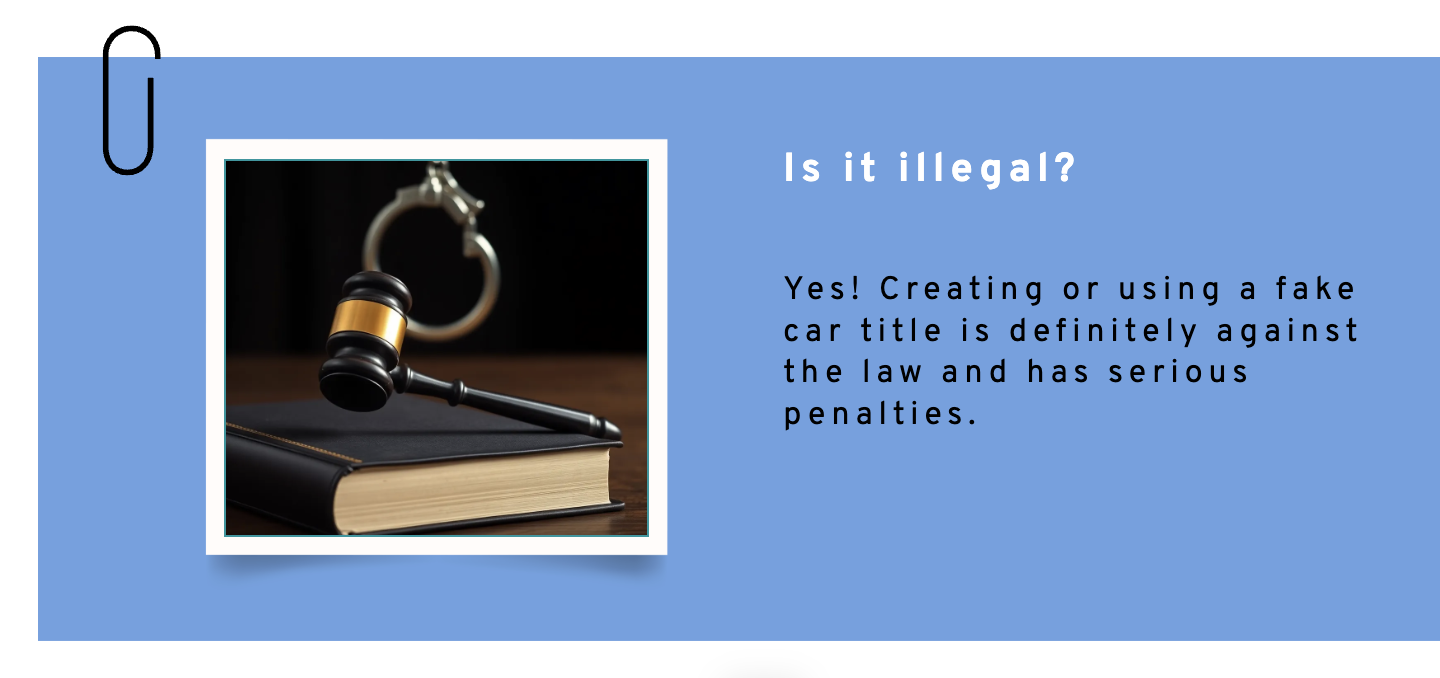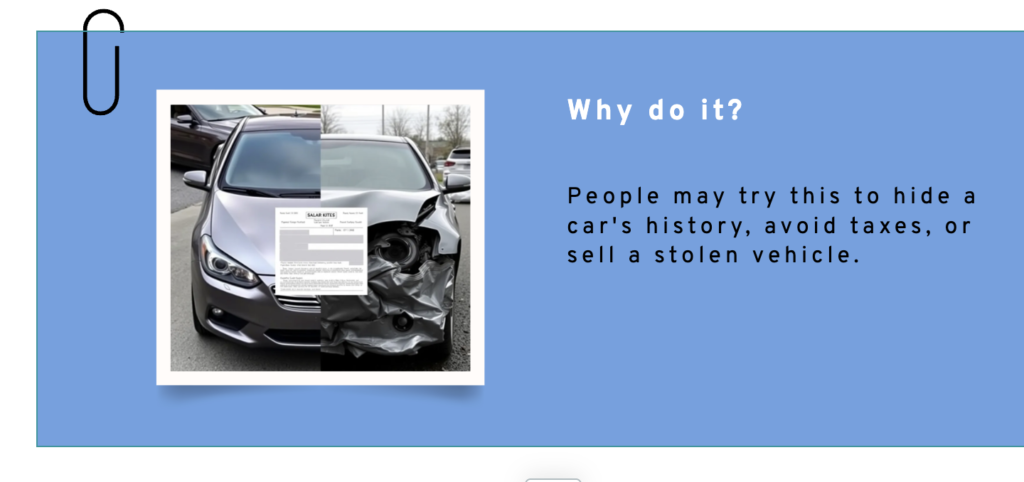Table of Contents
ToggleThese are the questions i get asked about fake car titles
Car ownership is a significant milestone, filled with excitement and anticipation. But what happens when the title you receive isn’t legitimate? Fake car titles are an unsettling reality in today’s automotive marketplace. With fraud on the rise, understanding how to navigate this complicated terrain is essential for buyers and sellers alike.
Whether you’re looking at used vehicles or new deals, knowing about fake car titles for sale can save you from serious headaches and costly mistakes. Let’s dive into the critical questions surrounding this topic so that you can make informed decisions moving forward.
1. Understanding Fake Car Titles

Fake car titles can lead to a host of problems for unsuspecting buyers. A car title is an official document that proves ownership, detailing essential information like the Vehicle Identification Number (VIN) and past owners. When this document is altered or forged, it creates confusion and potential legal issues.
Common types of title fraud include washed titles, which hide salvage histories, and counterfeit documents mimicking legitimate ones. Recognizing these fraudulent practices is crucial for protecting your investment in a vehicle.
1.1 What Is a Car Title?
A car title is a legal document that proves ownership of a vehicle. It contains important information, such as the Vehicle Identification Number (VIN), make and model, and the owner’s name and address.
When you buy or sell a car, this document transfers with the vehicle to establish rightful ownership. A clear title ensures no outstanding liens or claims against it, making it essential for smooth transactions in the automotive market.
1.2 Common Types of Title Fraud
Title fraud can manifest in several ways. One common method involves altering an existing title to change ownership or mileage. This often leads buyers into a trap, thinking they’re purchasing a legitimate vehicle.
Another frequent type is the use of counterfeit titles altogether. Scammers create fake documents that appear authentic, allowing them to sell stolen vehicles legally on paper. Awareness of these tactics helps protect potential buyers from falling victim to such scams.
1.3 Warning Signs and Red Flags
When buying a car, be vigilant for warning signs. A missing or mismatched VIN on the title is a major red flag. If the seller only provides photocopies of documents instead of originals, proceed with caution.
Additionally, if the price seems too good to be true, it probably is. Watch for sellers who are unwilling to answer questions about the vehicle’s history or those rushing you into a quick sale without proper documentation.
2. Dealing with Fake Car Titles
If you suspect you’ve bought a car with a fake title, understanding your legal rights is crucial. Buyers are often protected under consumer protection laws, allowing them to seek recourse against fraudulent sellers.
Victims of title fraud have options for recovery. You can report the crime to authorities or pursue civil action against the seller. Knowing how to navigate these processes can help restore some sanity in an otherwise chaotic situation.
2.1 Legal Rights for Buyers
When purchasing a vehicle, buyers have legal protections against fraudulent titles. If you discover that the title is fake after your purchase, you may seek remedies under state laws governing fraud and misrepresentation.
Your rights typically include the ability to return the vehicle for a refund or seek damages from the seller. Knowing these rights can empower you during negotiations or in potential legal actions related to fake car titles.
2.2 Recovery Options for Victims
If you find yourself a victim of fake car titles, recovery is possible. First, gather all relevant documents and evidence to support your case. This includes receipts, correspondence with the seller, and any records from your state’s Department of Motor Vehicles.
Next, consider reporting the fraud to local law enforcement or consumer protection agencies. They may assist in investigating the matter further. You can also explore filing a claim with your insurance company if applicable.
2.3 How to Sue in Fraudulent Title Transfer Cases
If you find yourself a victim of fraudulent title transfers, taking legal action may be necessary. Start by gathering all relevant documents, including the original title, purchase agreements, and any communication with the seller.
Next, consult with an attorney who specializes in automotive fraud or consumer protection. They can guide you through filing a lawsuit and help navigate the complexities of your case. Document everything carefully to strengthen your position in court.
3. Real-life Scenarios and Solutions

Many buyers have shared harrowing experiences of unknowingly purchasing cars with fake titles. One individual discovered after the sale that the vehicle had been reported stolen, leading to a lengthy and stressful recovery process.
Experts suggest documenting every transaction and communication related to car purchases. This evidence can be crucial in disputes. Seeking legal advice immediately is vital for anyone caught in such situations, as it significantly increases chances of recovering lost funds or securing their rightful ownership.
3.1 Personal Experiences Shared
Many people have faced the nightmare of dealing with fake car titles. One buyer recounted how he purchased what seemed like a great deal, only to discover later that the title was forged. The stress and confusion turned his dream car into a legal headache.
Another individual shared her experience of buying from an online marketplace, where the seller vanished after payment. She had no idea that fake car titles were so prevalent until it was too late.
3.2 Expert Legal Advice
Consulting an attorney experienced in auto fraud is crucial when dealing with fake car titles. They can provide insights tailored to your unique situation, helping you navigate the complexities of legal recourse.
These experts understand the nuances of title laws and can guide you on how to gather evidence effectively. Their knowledge ensures you’re equipped to make informed decisions while protecting your rights as a buyer facing potential fraud issues.
3.3 Buyer Rights and Responsibilities
Buyers have the right to receive accurate information about a vehicle’s title. This includes knowing its history and any potential liens or issues. If the seller provides false details, buyers can seek legal recourse.
Responsibility also lies with buyers to perform due diligence before finalizing a purchase. Conducting a title search can uncover hidden problems. Ignoring these steps might lead to financial loss and complications down the road. Always stay informed and vigilant in your transactions.
4. Prevention and Resources
To avoid falling victim to fake car titles, always verify the legitimacy of a title before making a purchase. Check with your local Department of Motor Vehicles for any discrepancies in ownership records.
Utilize resources like online guides and forums dedicated to vehicle purchases. Educate yourself on common scams and consult legal experts if you’re unsure about a deal. Building awareness is your first line of defense against fraudulent transactions.
4.1 Tips to Avoid Falling Victim to Title Scams
Research the vehicle’s history thoroughly before making a purchase. Use services like CARFAX or AutoCheck to verify details about ownership and title status. If the deal seems too good to be true, it probably is.
Always meet sellers in person and inspect the car carefully. Trust your instincts if something feels off, walk away. Consider working with reputable dealerships or certified pre-owned vehicles for added security against fake car titles.
4.2 Legal Guides and Assistance
Navigating the complexities of fake car titles can be daunting. Legal guides offer valuable insights into the steps you need to take if you suspect fraud. They help clarify your rights and responsibilities as a buyer.
Additionally, many organizations provide assistance tailored specifically for victims of title scams. These resources can connect you with legal professionals who specialize in automotive fraud, ensuring that you’re not alone in this challenging situation.
4.3 Lemon Law Attorneys: Your Best Defense
Lemon law attorneys specialize in protecting consumers against faulty vehicles, including those with fake titles. They understand the nuances of these cases and can help you navigate complex legal waters.
When faced with a fraudulent title situation, enlisting an experienced attorney ensures that your rights are defended. These professionals will guide you through the claims process while maximizing your chances for a favorable outcome. Their expertise is invaluable when you’re dealing with potential financial loss and fraud.
If you suspect a car title is fake, act quickly. Gather evidence of the fraud and document everything. This includes photos, emails, and any communication with sellers.
Don’t hesitate to report suspicious activity to local authorities or DMV offices. They can investigate further and potentially help protect others from similar scams. Legal steps may also be necessary if you’re a victim of fraud; seeking legal assistance will guide your next moves effectively.
5.1 Identifying Fraudulent Titles
Identifying fraudulent titles starts with careful scrutiny. Check the VIN against official records for discrepancies. If the title lacks proper seals or has signs of tampering, proceed with caution.
Look for inconsistencies in ownership history. A title that changes hands too frequently or shows unusual gaps can signal trouble. Trust your instincts—if something feels off, it’s worth investigating further before making any commitments.
5.2 Responding to Suspected Title Fraud
If you suspect title fraud, act swiftly. Gather all relevant documents related to the vehicle and title. This includes purchase agreements, communications with the seller, and any records of payments made.
Next, report your concerns to local law enforcement immediately. They can guide you on how to proceed and may open an investigation into fraudulent activities. Additionally, contact your state’s Department of Motor Vehicles for further assistance in addressing the issue effectively.
5.3 Seeking Legal Assistance and Support
When you suspect you’re dealing with fake car titles, acting promptly is crucial. Gather all documentation related to the purchase and any communications with the seller. Reach out to legal professionals who specialize in automotive fraud or consumer rights.
They can guide you through your options and help protect your interests. Remember, support is available—don’t hesitate to seek it out when faced with title fraud challenges. Your peace of mind matters as much as securing a legitimate vehicle transaction.
